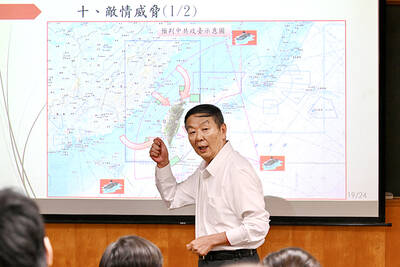The nation's business community yesterday expressed grudging support for the legislature's passage of a referendum bill among worries over possible resulting cross-strait tension.
"Referendums help resolve legislative standoffs, ushering in an era of direct democracy in Taiwan," Day Sheng-tung (
Day said that referendums would help achieve political consensus among the public in a divided country like Taiwan, which he said could be expected to be good for the local economy.
"More focus will then be put on economic endeavors rather than political infighting," he added.
Other business groups, however, expressed a more cautious view.
"As long as the principle of political stability is upheld, businessmen don't have much of an opinion," said Chen Cheng-yi (
Following the law's passage, which opposition parities dominated yesterday, Chen said that he hopes that no lingering standoffs between the executive and the legislative branches will take place despite Premier Yu Shyi-kun having previously threatened a Cabinet veto to the bill if approved clauses impose too many restrictions on referendum initiatives.
"Even if the premier plans to open another round of voting, his administration should follow due processes in a lawful way," Chen added, hoping politicians could put ideological differences aside to jointly address economic issues.
Theodore Huang (
But a senior entrepreneur, who requested anonymity, thought little of the bill, seeing it more as a strategy game between the major parties.
"You should not take the bill too seriously," he said. "Its significance lies more in a sense that the pan-blue camp trumped the Democratic Progressive Party's campaign ace."
The bill has fueled political tension and will continue to be a centerpiece of the campaign leading up to the presidential election next March. The entrepreneur said he expected this to have a negative impact on the local economy.
Most businessmen yesterday refused to speculate on how outraged China would be over the bill's passage and the effect of that on cross-strait trade relations.

RETHINK? The defense ministry and Navy Command Headquarters could take over the indigenous submarine project and change its production timeline, a source said Admiral Huang Shu-kuang’s (黃曙光) resignation as head of the Indigenous Submarine Program and as a member of the National Security Council could affect the production of submarines, a source said yesterday. Huang in a statement last night said he had decided to resign due to national security concerns while expressing the hope that it would put a stop to political wrangling that only undermines the advancement of the nation’s defense capabilities. Taiwan People’s Party Legislator Vivian Huang (黃珊珊) yesterday said that the admiral, her older brother, felt it was time for him to step down and that he had completed what he

Taiwan has experienced its most significant improvement in the QS World University Rankings by Subject, data provided on Sunday by international higher education analyst Quacquarelli Symonds (QS) showed. Compared with last year’s edition of the rankings, which measure academic excellence and influence, Taiwanese universities made great improvements in the H Index metric, which evaluates research productivity and its impact, with a notable 30 percent increase overall, QS said. Taiwanese universities also made notable progress in the Citations per Paper metric, which measures the impact of research, achieving a 13 percent increase. Taiwanese universities gained 10 percent in Academic Reputation, but declined 18 percent

CHINA REACTS: The patrol and reconnaissance plane ‘transited the Taiwan Strait in international airspace,’ the 7th Fleet said, while Taipei said it saw nothing unusual The US 7th Fleet yesterday said that a US Navy P-8A Poseidon flew through the Taiwan Strait, a day after US and Chinese defense heads held their first talks since November 2022 in an effort to reduce regional tensions. The patrol and reconnaissance plane “transited the Taiwan Strait in international airspace,” the 7th Fleet said in a news release. “By operating within the Taiwan Strait in accordance with international law, the United States upholds the navigational rights and freedoms of all nations.” In a separate statement, the Ministry of National Defense said that it monitored nearby waters and airspace as the aircraft

UNDER DISCUSSION: The combatant command would integrate fast attack boat and anti-ship missile groups to defend waters closest to the coastline, a source said The military could establish a new combatant command as early as 2026, which would be tasked with defending Taiwan’s territorial waters 24 nautical miles (44.4km) from the nation’s coastline, a source familiar with the matter said yesterday. The new command, which would fall under the Naval Command Headquarters, would be led by a vice admiral and integrate existing fast attack boat and anti-ship missile groups, along with the Naval Maritime Surveillance and Reconnaissance Command, said the source, who asked to remain anonymous. It could be launched by 2026, but details are being discussed and no final timetable has been announced, the source